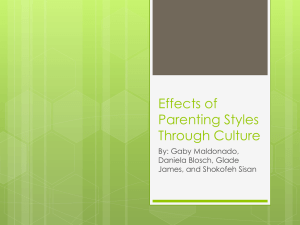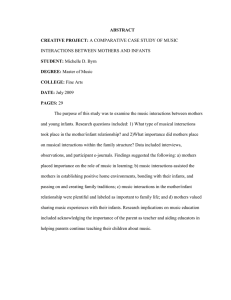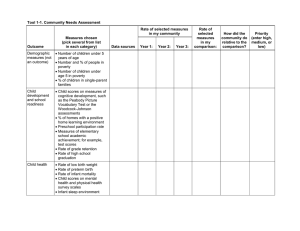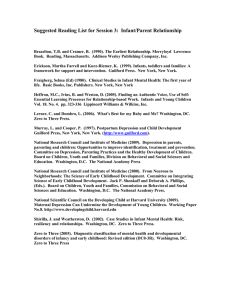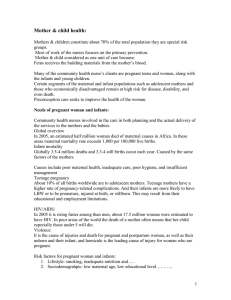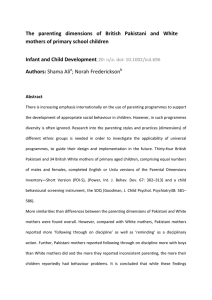Parenting Project Dear Community Members, Eastern Michigan University
advertisement
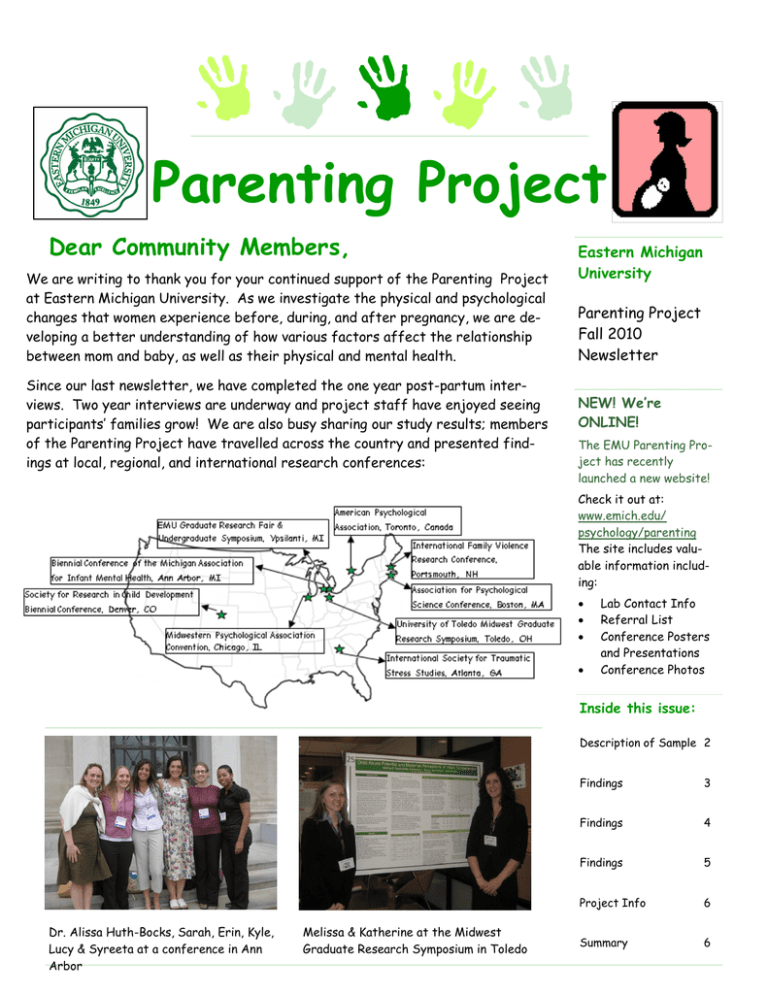
Parenting Project Dear Community Members, We are writing to thank you for your continued support of the Parenting Project at Eastern Michigan University. As we investigate the physical and psychological changes that women experience before, during, and after pregnancy, we are developing a better understanding of how various factors affect the relationship between mom and baby, as well as their physical and mental health. Since our last newsletter, we have completed the one year post-partum interviews. Two year interviews are underway and project staff have enjoyed seeing participants’ families grow! We are also busy sharing our study results; members of the Parenting Project have travelled across the country and presented findings at local, regional, and international research conferences: Eastern Michigan University Parenting Project Fall 2010 Newsletter NEW! We’re ONLINE! The EMU Parenting Project has recently launched a new website! Check it out at: www.emich.edu/ psychology/parenting The site includes valuable information including: Lab Contact Info Referral List Conference Posters and Presentations Conference Photos Inside this issue: Description of Sample 2 Dr. Alissa Huth-Bocks, Sarah, Erin, Kyle, Lucy & Syreeta at a conference in Ann Arbor Melissa & Katherine at the Midwest Graduate Research Symposium in Toledo Findings 3 Findings 4 Findings 5 Project Info 6 Summary 6 Description of Sample Where Participants Heard about the Study Parenting Class, 2% Word of Mouth, 10% Donation Centers, 5% Subsidized/ Temporary Housing Facility , 7% Head Start/Daycare Programs, 7% CommunityBased Health Clinics, 23% WIC Program, 18% Community Baby Shower, 12% Student Areas at Local Colleges, 16% Participant Characteristics Some Graduate School, 9% High School Diploma or less, 20% Four Year Degree, 14% Race Page 2 Education Some College/ Trade School, 57% At the beginning of the study, Average Age: 26 (range= 18-42) 30% first-time mothers Median monthly income: $1,500 88% receive services from WIC 90% have public health insurance A majority of women receive food stamps and/or public cash assistance Marital Status: 64% Single, 28% Married, 4% Separated, 4% Divorced Parenting Project Perception of Infant Emotion Although associations between the perception of infant emotion and previous experiences of childhood maltreatment have occurred in other research studies, our findings did not indicate such a relationship. However, we found lower levels of maternal depression correlated with more positive appraisals of infant facial emotions. Women who felt less depressed reported seeing more positive emotions in photographs of infants overall. Interestingly, women who reported feeling more depressed also used more words that fell into the categories of both “happy” and “anger” to describe the infants’ expressions. This may illustrate a tendency for women who are depressed to attribute strong, clear emotion labels to infant facial expressions that may be more neutral or difficult to label. These findings indicate that depressed mothers seem to read infant facial expressions differently than non-depressed mothers. Maternal Mental Health Research indicates that whether or not a person develops mental health problems depends on various factors. Our findings indicate that mothers who report more financial resources are less likely to develop symptoms of post-traumatic stress and post-partum depression. We found healthy adult romantic relationships were tied to lower levels of reported mental health symptoms. Specifically, mothers who display less avoidance in their romantic relationships also endorsed fewer mental health problems. In sum, women who have greater financial resources and healthier romantic relationships report less mental health distress. Infant Physical Health In our study we have explored various health factors in relation to mothers’ self-esteem. We found that mothers’ health during pregnancy and delivery was not related to maternal self-esteem at three months post-partum. However, infant complications, such as difficulty breathing and infections, were related to maternal self-esteem at three months post-partum. We found that this association between infant complications and maternal self-esteem was affected by maternal depression. Specifically, women who reported infant complications and also reported low levels of depression at three months post-partum felt better about themselves as mothers than women who reported infant complications and higher levels of depression. These findings indicate the importance of reducing both infant complications and maternal depression in order to enhance how women feel about themselves as effective mothers. Parenting Project Page 3 Infant Social-Emotional Outcomes Social-emotional well-being in infants at three months of age was related to social-emotional well-being in infants at one year of age. Additionally, we found that different maternal risk factors, such as abusive relationships and mental health symptoms influenced infants’ social-emotional problems. For example, lower maternal self-esteem and higher parenting stress influenced infant social-emotional difficulties during the first year of life. These results suggest it is very important to reduce mothers’ distress in order to improve infant well-being. We found that a mother’s ability to promptly and accurately respond to her baby’s needs (maternal sensitivity) and the relationship between mom and baby (infant attachment) were both associated with infant socialemotional outcomes. As expected, our study also found that less exposure to domestic violence was related to healthier infant social-emotional development. Child Abuse Potential Findings suggest that having more social support and less child abuse potential during pregnancy is related to more emotional and verbal responsitivity (warmth, sensitive parenting, positive affection) toward their infants 12 months post-partum. Page 4 Findings indicate important correlations between education, mental health, and substance use during pregnancy. Women who reported low levels of depression and/or anxiety endorsed less substance use during pregnancy. Next, child abuse potential was lowest in mothers who reported having more education, lower levels of depression and anxiety, and less substance use during pregnancy. It is important to remember the importance of these prenatal factors because of their long-term implications on infant health. Parenting Project Relationships, Parenting, and Infant Outcomes Several factors seem to affect maternal sensitivity, which refers to a mother’s ability to accurately and promptly respond to her baby’s needs. Our findings indicate that a woman’s comfort in personal relationships is associated with higher levels of maternal sensitivity. Additionally, women who report accepting and encouraging relationships with their own parents also display greater levels of maternal sensitivity. Conversely, women who report more signs of discomfort in current relationships tend to be less sensitive to their babies’ cues, especially if they also reported childhood maltreatment. These findings highlight the importance of assessing for the quality of current and parental relationships and past experiences of harmful relationships in order to help mothers improve their abilities to be sensitive caretakers. Additionally, our findings underscore the importance of maternal sensitivity on infant development; mothers who displayed higher levels of sensitivity were also more likely to have infants with healthier social and emotional outcomes at one year post-partum. Alissa, Erin, Kyle, Syreeta, & Lucy at SRCD Conference in Denver, Colorado Parenting Project Fall 2010 Newsletter Melissa & Katherine win 2nd place in Toledo, Ohio Syreeta at EMU’s Graduate Research Fair Page 5 Eastern Michigan University Parenting Project Dr. Alissa Huth-Bocks 537 Mark Jefferson Ypsilanti, MI 48197 Ana at EMU’s 2009 Graduate Research Fair Phone: 734-487-2238 E-mail: ahuthboc@emich.edu Jess, Brianna, Maegan, and Angie at EMU’s 2009 Undergraduate Research Symposium Summary of Findings The Parenting Project is making important discoveries concerning the physical and mental health of both mothers and their infants. Thanks to our wonderful recruitment sites and participating families, we are gaining a better understanding of how to improve interventions and public resources to help address the needs of mothers and families in our community. Based on our study results, it will continue to be important to focus services on assessing and improving maternal mental health, ensure that community resources are both available and accessible, and continue to educate mothers about healthy prenatal and parenting practices. As our findings demonstrate, parenting skills are very important to infants’ social and emotional health. There is a need to implement clinical interventions during and after pregnancy for at-risk mothers to support the mother-infant relationship. As we continue to learn about healthy parenting and family relationships, we are excited to pass this knowledge on to the community. “We are gaining a better understanding of how to improve interventions and public resources to help address the needs of mothers and families in our community.” Looking Ahead... The Parenting Project has recently gained approval to continue our study! We will continue to keep in touch with participants so that we can conduct additional interviews as their children turn three years old. We are looking forward to continuing the study and greatly appreciate all of our participating mothers and children! Parenting Project Fall 2010 Newsletter Page 6
